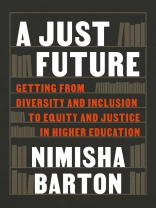A Just Future addresses the precarious future of American higher education and diversity and inclusion initiatives along with it. From a global pandemic to a national reckoning with anti-Blackness, the 2020 historical conjuncture brutally revealed the impact of structural inequalities on historically marginalized communities and galvanized college students, diversity officers, and educators on a scale not seen since the 1960s. In so doing, it exposed the unfinished business of the civil rights era and the limits of diversity and inclusion reforms.
The time has come to create a more just future for the most marginalized community members at higher education institutions. To do so, we must share a common understanding of where we have been, what went wrong, and how to get back on track. Barton draws on abolitionist frameworks of social change to provide a bold, comprehensive guide to abolitionism in education, not only for diversity, equity, and inclusion practitioners but also higher education leaders and faculty. As a result, A Just Future provides new values, tools, and mindsets to address—and redress—ongoing forms of oppression that thrive on college campuses.
Table des matières
Introduction
1. Origins
2. Whitelash
3. Turning Points
4. Diversity Practitioners and Institutional Whiteness
5. The Classroom and the Culture Wars
6. Programs and Pedagogical Innovation
7. HWCUs and Restorative Justice
Higher Education and Transformative Justice
A propos de l’auteur
Nimisha Barton is a Visiting Researcher at the University of California, Irvine, and a Diversity, Equity, and Inclusion (DEI) Consultant in higher education. She is the author of the award-winning Reproductive Citizens and a recipient of the Tyler Stovall Mission Prize for contributions to DEI in higher education.












